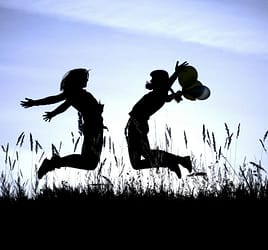
“Every child is different, right?”
Imagine yourself, sitting at a bench near the local playground. The sun is shining, and you peacefully observe how three boys together are playing with marbles. You also see a girl, who carefully sneaks towards the boys from behind the bushes. And then… “BOOO!!” echoes across the playground as the girl jumps from the bushes and tries to scare the three boys. All three boys seem startled at first. One boy quickly seems to recover though, picks up his marbles, and is ready for another marble game. However, another boy’s face turns red and he starts to scream loudly, furiously chasing the girl who frightened him. The third boy runs to his mother, who sits next to you at the bench, while crying, seemingly inconsolable. His mother looks at you, shrugs her shoulders, and says: “Ah well, every child is different, right?”
Every child is different. You probably heard this phrase before. But how do we actually know this to be true? And, even more important, how do we prevent this from being a knockdown argument? That is, if we know that every child is different, how can we truly understand, appreciate, and emphasize their individual strengths and differences? In September 2017, I started my PhD project, which is devoted to answering these questions. In this project, which is called IederKindIsAnders (EveryChildIsDifferent), I investigate psychological strengths and vulnerabilities in a large sample of children (4-12 years of age) and adolescents (10-14 years of age), and the effects of parenting, together with Peter de Jonge, Bertus Jeronimus and Marijn van Dijk.

The dual continua model of mental health. Image retreived from Keyes, C. L. (2014). Mental health as a complete state: How the salutogenic perspective completes the picture. In Bridging occupational, organizational and public health (pp. 179-192). Springer, Dordrecht.
The aim of this project is to specifically explore the associations and dynamic interactions between psychological strengths and vulnerabilities in Dutch children and adolescents. The project is based on an understanding of mental health as a dimensional phenomenon. In line with this, the research is conducted from the perspective of the dual continua model of mental health and mental illness [1]. This model assumes that mental health and mental illness are two different, yet related dimensions (see Figure on the right). We understand mental health as being more than the mere absence of mental illness. We believe that even in the context of psychological vulnerabilities or symptoms, individual strengths and resources can help children to be well and function well.
As a sequel to the HoeGekisNL-project (HowNutsAreTheDutch; also see this blog post), we collect data by asking children, adolescents and their parents to participate in an online study in which they fill in questionnaires and a 30-day diary. These questionnaires and diary cover the child’s/adolescent’s psychological functioning and well-being in the context of their environment, such as family interactions (i.e., with their parents) and experiences. Participants are rewarded for their participation with automated personalized feedback, which can contribute to their understanding of their own well-being. In a second step of the project, we will use the findings to create and implement a mental health education program for children. In sum, this project promises to add to both the scientific understanding, as well as the mutual understanding between children with and without mental illness, about the typical strengths and differences that characterize individual children.
Want to know more or want to participate? The website of the project is expected the be launched in the fall of 2018. Keep an eye on this blog post (or the national news) to find out when the website is online!
Relevant links and publications
NOTE: Image by Tomasz Stasiuk, licenced under CC BY 2.0



